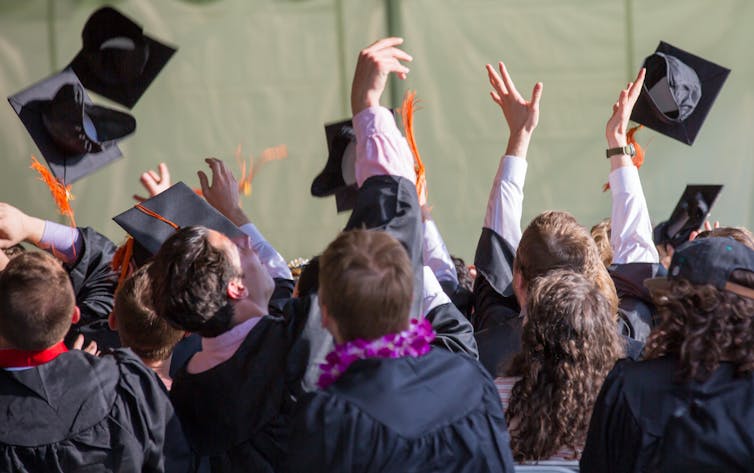Below is a republished version of an article that Shandell Houlden and I published in The Conversation last week, summarizing some of the themes that arose in our Speculative Learning Futures podcast.
3 ways higher education can become more hopeful in the post-pandemic, post-AI era

(Pexels/Emily Ranquist)
Shandell Houlden, Royal Roads University and George Veletsianos, Royal Roads University
We live at a time when universities and colleges are facing multiplying crises, pressures and changes.
From the COVID-19 pandemic and budgetary pressures to generative artificial intelligence (AI) and climate catastrophe, the future of higher education seems murky and fragmented — even gloomy.
Student mental health is in crisis. University faculty in our own research from the early days of the pandemic told us that they were “juggling with a blindfold on.” Since that time, we’ve also heard many echo the sentiment of feeling they’re “constantly drowning,” something recounted by researchers writing about a sense of precarity in universities in New Zealand, Australia and the western world.
In this context, one outcome of the pandemic has been a rise in discourses about specific, quite narrowly imagined futures of higher education. Technology companies, consultants and investors, for example, push visions of the future of education as being saved by new technologies. They suggest more technology is always a good thing and that technology will necessarily make teaching and learning faster, cheaper and better. That’s their utopian vision.
Some education scholars have been less optimistic, often highlighting the failures of utopian thinking. In many cases, their speculation about the future of education, especially where education technology is concerned, often looks bleak. In these examples, technology often reinforces prejudices and is used to control educators and learners alike.

Annie Spratt/Unsplash
In contrast to both utopian and grim futures, for a recent study funded by the Social Sciences and Humanities Research Council, we sought to imagine more hopeful and desirable higher education futures. These are futures emerging out of justice, equity and even joy. In this spirit, we interviewed higher education experts for a podcast entitled Speculative Learning Futures.
When asked to imagine more hopeful futures, what do experts propose as alternatives? What themes emerge in their work? Here are three key ideas.
It’s about more than technology
First, these experts reiterated that the future of education is about more than technology. When we think about the future of education we can sometimes imagine it as being tied entirely to the internet, computers and other digital tools. Or we believe AI in education is inevitable — or that all learning will be done through screens, maybe with robot teachers!
But as Jen Ross, senior lecturer in digital education observes, technology doesn’t solve all our problems. When we think about education futures, technology alone does not automatically help us create better education or healthier societies. Social or community concerns like social inequities will continue to affect who can access education, our education systems’ values and how we are shaped by technologies.
As many researchers have argued, including us, the pandemic highlighted how differences in access to the internet and computers can reinforce inequities for students.
AI can also reinforce inequities. Depending on the nature of data AI is trained with, the use of AI can perpetuate harmful biases in classrooms.
Ross notes in her recent book that social or community concerns shape how our societies could imagine education.
Researchers involved with Indigenous-led AI are tackling questions around how Indigenous knowledge systems could push AI to be more inclusive.
Policymakers and educators should consider technology as one part of a toolkit of responses for making informed decisions about what technologies align with more equitable and just education futures.
Emphasizing connection and diversity
In line with thinking about more than technology, the second theme is a reminder that the future of education is about healthy social connection and social justice. Researchers emphasize fostering diversity and celebrating diverse expressions of strengths and needs.
Experts envision and call for education that is more sustainable for everyone, not just a privileged few. Kathrin Otrel-Cass, professor at University of Graz, and Mark Brown, Ireland’s first chair in digital learning and director of the National Institute for Digital Learning at Dublin City University, suggest this means teaching and learning should be at a slower pace for students and faculty alike.
In this vision, policymakers must support education systems that regard the whole learner as an individual with specific physical, mental, emotional and intellectual needs, and as a member of multiple communities.
Acknowledge the goodness of the present
There’s lots to be gained by noting and supporting all the great things related to education that are happening in the present, since possible futures emerge from what now exists.
As two podcast guests, Eamon Costello, professor at Dublin City University and collaborator Lily (Prajakta) Girme, noted, we need to acknowledge the good work of educators and learners in the small wins that happen every day.
In 2019, researchers Justin Reich and José Ruipérez-Valiente wrote: “new education technologies are rarely disruptive but instead are domesticated by existing cultures and systems. Dramatic expansion of educational opportunities to under-served populations will require political movements that change the focus, funding and purpose of higher education; they will not be achieved through new technologies alone.”
These are words worth repeating.
Shandell Houlden, Postdoctoral Fellow, School of Education and Technology, Royal Roads University and George Veletsianos, Professor and Canada Research Chair in Innovative Learning and Technology, Royal Roads University
This article is republished from The Conversation under a Creative Commons license. Read the original article.
